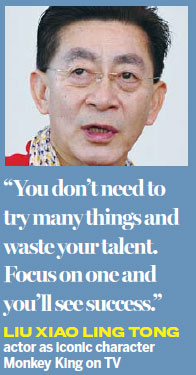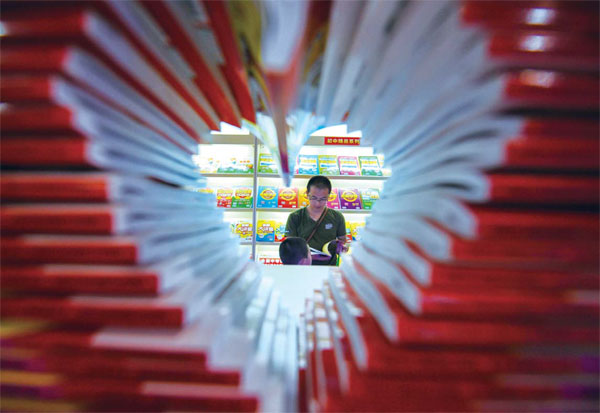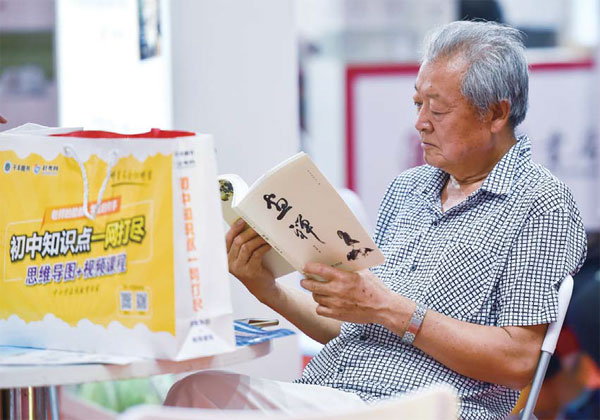The return of print
Updated: 2016-08-12 07:56
By Mei Jia and Yuan Hui(China Daily Europe)
|
|||||||||
An exposition in Inner Mongolia has put the spotlight back on offline reading
With a policy boost to strengthen reading in China, the traditional book market is seeing signs of revival after a struggle in the face of a technological onslaught.
The 26th National Book Trading Expo, recently held in the northern city of Baotou, Inner Mongolia autonomous region, is a testimony to that.
|
The National Book Trading Expo has grown into a major event for the country's publishing industry since its launch in 1980. Photos by Xinhua |
|
The three-day expo drew about 716,000 visitors. |
About 716,000 visitors attended the three-day expo that concluded on Aug 7, buying more than 1 million copies worth some 30 million yuan ($4.5 million, 4.06 million euros) at cover prices.
At the expo, some visitors said they came to buy their favorite titles, while others patiently waited for hours for autographs of their beloved authors, including Taiwan writer and illustrator Tsai Chih-chung, who now lives on the mainland.
"We've witnessed much progress since 11 ministries launched a national campaign to promote reading in 2006," says Yan Xiaohong, deputy director of the administration.
This year's expo not only served as a platform for big publishers and smaller booksellers, it was also a festival for readers.
The fair's launch in 1980 was a reflection of the economic and social changes taking place in China then.
This year, the expo had a forum at which TV anchor and singer Gao Xiaosong and established writer Mai Jia spoke on intellectual property and how books can be adapted into TV series and films.
The expo also honored 10 avid readers, with the youngest being 9-year-old Li Fumutong from Beijing, who has read some 5,000 books, and 108-year-old economist Yang Jingnian from Tianjin, who says his life has been shaped and changed by reading.
China Publishing Group hosted a readers' forum that saw celebrity writers giving speeches and sharing personal experiences. Well-known essayist Yu Qiuyu shared his views on reading on mobile phones versus reading printed books.
At the session, author Tsai said he had read more than 20,000 titles.
His graphic books will be translated and published in Mongolian, he said at the expo.

"I don't carry a mobile phone with me when I'm working. I just cut myself off from the outside world and focus on my writing," Tsai says.
The celebrity author events were also popular as evident from the expo's many book launches.
Some of the other genres showcased at the expo included children's literature, novels, creative explanations of the country's policies and Party ideals, and reference books.
Liu Xiao Ling Tong, whose real name is Zhang Jinlai, also thrilled the audience in Baotou with his Monkey King act. He has played the iconic character on TV. Now at age 57, he is still able to perform a few stunts.
Zhang says many Chinese have watched the series Journey to the West more than three times.
But the main reason for his appearance at the expo was his autobiography, The Pilgrim, which he named after receiving thousands of suggestions from readers at home and abroad. It was published in June.
"The Monkey King is actually a grassroots hero and has a lot of positive energy," Zhang says. "My book talks about one idea: You don't need to try many things and waste your talent. Focus on one and you'll see success."
As for children's books, author Hei He, of Mongolian ethnicity, is known for his animal tales. At the expo he promoted one of his latest novels, The Flag Camel, which tells the story of a white camel that guards land near a mining area.
A new book on Karl Marx, derived from a TV program, and a new book on the stories of 40 Party members, edited by professor Xie Chuntao, also were featured at the expo.
Two reference books also released their latest editions.
One is a dictionary on the origin of words, both from Chinese and foreign languages, by Wang Zhanyi.
Wang focuses on some 2,000 words quoted from 6,000 newspaper and 300,000 magazine articles he has collected over the past 30 years.
The new 19-volume Encyclopedia of the Chinese Military was also unveiled by China Publishing House at the event.
Contact the writers through meijia@chinadaily.com.cn
(China Daily European Weekly 08/12/2016 page21)
Today's Top News
Chinese investment in European football
Myanmar's Suu Kyi to visit Beijing
Ukraine denies attempted troop invasion of Crimea
Solidarity called to firefighters facing wildfires
Eurostar train staff to strike for seven days: UK union
Trump's gun rights comments ignite firestorm
China consumer prices up 1.8% in July
Video introduces G20 city Hangzhou to Europe
Hot Topics
Lunar probe , China growth forecasts, Emission rules get tougher, China seen through 'colored lens', International board,
Editor's Picks

|

|

|

|

|

|









